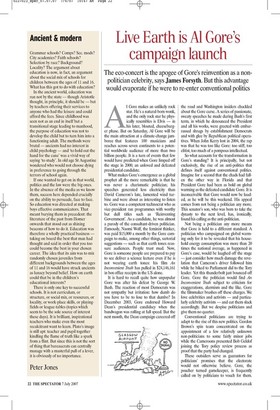Ancient & modern
Grammar schools? Comps? Sec. mods? City academies? Faith schools? Selection by race? Background? Locality? The argument about education is now, in fact, an argument about the social mix of schools for children between the ages of 11 and 16. What has this got to do with education?
In the ancient world, education was run not by the state — though Aristotle thought, in principle, it should be — but by teachers offering their services to anyone who had the leisure and could afford the fees. Since childhood was seen not as an end in itself but a transitional stage leading to manhood, the purpose of education was not to develop the child but to turn him into a functioning adult. The methods were brutal — ancients had no interest in child psychology — and 'to hold out the hand for the cane' was a vivid way of saying 'to study'. In old age St Augustine wondered who would not choose dying in preference to going through the terrors of school again.
If one wanted to get on in that world, politics and the law were the big ones. In the absence of the media as we know them, success here depended crucially on the ability to persuade, face to face. So education was directed at making boys effective communicators. That meant burying them in precedent: the literature of the past from Homer onwards that stood out as shining beacons of how to do it. Education was therefore a wholly practical business — taking on board the best that man had thought and said in order that you too could become the best in your chosen career. The idea that its aim was to mix randomly chosen juveniles from different backgrounds between the ages of 11 and 16 would have struck ancients as lunacy beyond belief. How on earth could that be in the children's educational interests?
There is only one key to successful schools. It is not curriculum, or structure, or social mix, or resources, or locality, or work-place skills, or playingfields or league-tables (topics which seem to be the sole source of interest these days). It is brilliant, inspirational teachers who make even the most recalcitrant want to learn. Plato's image is still apt: teacher and pupil together kindling the flame of truth like a spark from a flint. But since this is not the sort of thing that bureaucrats can centrally manage with a masterful pull of a lever, it is obviously of no importance.



















































 Previous page
Previous page